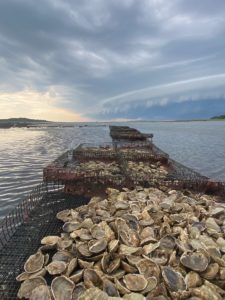WELLFLEET — When Nancy Civetta was hired in 2017 as the town’s shellfish constable, she was given a clear directive: “enforcement, propagation, and communication,” she said. Civetta took it to heart.

“I have been poring over the regulations ever since,” she said, which has “taken a long time and a lot of work.”
One of the two legal ways a person can lease a $25 per-year per-acre shellfishing grant — a plot of bayside bottom on the flats — is through a lottery. The rules state that a lottery is to be held to reallocate a grant that becomes available when a shellfisherman either gives back or forfeits his or her license to the town, which owns the flats that comprise 135 grants in all.
The catch is that, historically, lotteries have been rare. Before Civetta was hired, “nobody remembers it ever happening,” she said. Instead, as the Independent reported in 2019, grants were passed down to children or coworkers or quietly sold, though officially in such cases grant holders were selling their gear, not the grant itself.
These practices have impeded entry of the next generation of willing shellfish farmers into the industry, Civetta said.
The other way a newer shellfisherman can obtain a grant is by working as an employee of another farmer in the hope that one day the grant will be passed down. Even then, “it’s not a given,” said Civetta.
Gradually, newcomers are finding their way in here. In 2018, the first lottery in over 18 years was held to reassign a three-acre grant on Indian Neck. There were 12 applicants; the grant went to Justin Lynch, who later added Eben Kenny as joint grant holder.
Now, another lottery will be held on Dec. 20 for two 0.92-acre grants on Egg Island. And at the Nov. 29 meeting of the shellfish advisory board, Civetta announced the opening of two more three-acre grants on Indian Neck.
This was a surprise. “I didn’t think any would come up in the future,” advisory board Vice Chair Tom Siggia said. “Then all of a sudden, here are two from Egg Island and a couple from Indian Neck.”
The reason, said Town Administrator Rich Waldo, is enforcement. “The town has been doing a better job of enforcing the regulations than it has in years past,” he said.
One regulation in particular has led to the forfeiture of underused grants. The Evidence of Productivity clause, also known as the “Use It or Lose It” rule, requires each grant holder to spend $1,000 on seed and gear during the first three years of holding a license and to produce a minimum of $1,000 worth of shellfish per year per acre after that.
According to Civetta, if an oyster goes for 50 cents a pop, “that means you have to sell 2,000 oysters a year,” which is “very reasonable.”
“It’s practically nothing,” said shellfisherman Andrew Jacob. “You could meet the requirement in one week.” He added that “a lot of grants have just been sitting there.”
When a grant holder does not meet the minimum, the shellfish dept. sends a letter. An appeal hearing may be requested within two weeks.
But the previous holders of grant #95-15 on Egg Island, which is in the Dec. 20 lottery, never appealed. Luene and Schooner Grady had not been meeting the minimum for more than a decade, and the shellfish dept. began warning them in 2017. At a June 7 hearing, the select board voted for forfeiture.
The other grant on Egg Island, #95-16, has never been used. Civetta discovered it sitting empty while visiting the Gradys’ grant.
One of the two grants on Indian Neck was previously leased by the Dennis-based Aquacultural Research Corp., which was forced to give up the grant after the select board determined last summer that it did not meet the domicile regulation, which requires all grant holders to have lived in Wellfleet for at least a year.

The other available grant on Indian Neck was forfeited because of the minimum productivity requirements, Civetta said. It had been held by Buddy and Allison Paine.
Some see the regulations as unfair. William “Chopper” Young, who works two three-acre grants on Indian Neck, said that Civetta does her job “very correctly. Some might say she does it too correctly.”
Young has also been cited by the shellfish dept. for failure to meet the minimum. He was allowed to keep his license on the condition that he increase productivity.
Others think change is long overdue. “Nancy has done a really good job to get new opportunity for young people that are trying to make a living,” said Andrew Jacob. “It’s really challenging as a young person to make it out here. It seemed like they gave all the grants away in the ’80s. The word around town was that they weren’t making any new ones.”
Securing his 1.5-acre grant near Blackfish Creek six years ago was life-changing, Jacob said. “The second I got an oyster farm, I had stability,” he said, “and I was able to buy a house a year or two after that. It was a game-changer. You can make a living off an acre. Even half an acre. Most people who have a big oyster farm are only using a small portion of it.”
Siggia agrees that enforcing the rules is important. “We want to make sure we’re keeping the young adults here in Wellfleet by giving them an opportunity to start a business,” he said.
At press time this week, the town had received four complete applications for the Egg Island lottery. But Civetta said she thinks more would be submitted before the deadline on Dec. 7.
The shellfish dept. will announce the lottery for the two Indian Neck plots after the shellfish advisory board makes its recommendations on grant sizes and the select board establishes them.
“It’s important that our cultural heritage is passed down and that new opportunities open up,” Civetta said. “The lottery process is our ticket to that.”
Editor’s note: An earlier version of this article, published in print on Dec. 8, incorrectly stated that an aquaculture grant was awarded by lottery in 2018 to Justin and Melissa Lynch. The award went to Justin Lynch alone. The earlier version also incorrectly reported that the shellfish dept. would establish grant sizes before the next Indian Neck lottery; the select board will make that determination.



